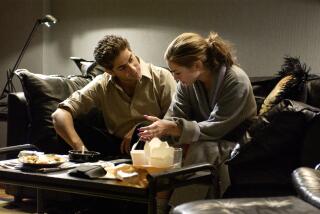Victory Has New Meaning to Romanians
FLORENCE, Italy — One of the very first things Cornel Dinu did, upon arriving in the tiny Italian town of Telese to commence final preparations for the World Cup, was to express the sincere relief that he and his fellow Romanians felt, on their soccer squad and as a whole, at no longer being under the thumb of a government dictatorship, at being able to come and go and say as they pleased, at being free.
The delegation was delighted to be here--and quite nearly as happy as the 1,000 other Romanians who had been the thrilled recipients of a free World Cup holiday in Italy presented to them by private Italian fans and sponsors, who felt not only a cultural kinship with Romanians but a shared joy at their escape from oppression.
With several days remaining before the tournament’s first match, the principal worry on the minds of Dinu, Romania’s deputy minister of sport, and his players, was how to get more news of the effects of an earthquake that had shaken their country shortly after the team’s departure. Delegation members got in touch with most of their families by telephone, and learned that, generally speaking, everything back home was all right.
But it was not.
Citizens were being beaten and shot. Coal miners, called upon as a kind of makeshift militia, were trading blows with students in the Bucharest streets. Any tranquility that had followed the expulsion from office and subsequent public execution of President Nicolae Ceausescu was gone, and once more, Romanians understood the feeling of fear. They knew it during last December’s bloody civil riots, and now they knew it again.
Here in Italy, while Dinu noted his anxiety and concern over the political unrest at home, he said on June 15 that the players were attempting to concentrate on the soccer matters at hand. The previous day, Romania’s players had called an unscheduled meeting among themselves to talk things over, and emerged with a rallying cry that, as one of them put it: “We will play for freedom. We will play for the ideals of the revolution, which must not be trampled over.”
On the field, the Romanians defeated the Soviet Union, then read with great satisfaction a congratulatory telegram from Ion Iliescu, the new president of the republic, and from Petre Roman, their prime minister, urging them to continue their superb play. A loss to Cameroon put the team’s advancement to the World Cup’s next stage in jeopardy, but when Gavril Balint headed in a goal to tie Argentina, 1-1, at Naples, the Romanians had reached the second round for the first time in their history, and they were ecstatic.
The coach, Emerich Jenei, calling it a historic occasion, acknowledged that the violence back home had certainly “left traces in the hearts of the players.” Yet, he persuaded himself that while political matters would iron themselves out, it was his duty to make certain that Romania’s football problems came first.
Soccer, though, had become the last thing on the minds of many of the coach’s compatriots who had won the free trip to Italy. Many of these people began applying for political asylum, sometimes even with whichever local political authority happened to be at hand, among them mayors of small villages who had not the slightest notion of how to award anybody political asylum.
In Benevento, northeast of Naples and not far from Telese, the number of Romanians seeking asylum was reported to have swelled to 104 as recently as Tuesday. One 23-year-old man from Bucharest was quoted as saying, “I have been shot once and do not want to go back and be shot again,” as he sat in Benevento’s police station waiting for somebody, anybody, to help him.
“People are continuing to turn up,” said Emilio Ilario, a spokesperson for the Benevento police. “It has become a tide.”
They were fearful, apparently, that those sympathetic to the old Ceausescu regime, including members of the Securitate secret police, would be dispensing retribution to any Romanians who opposed them, that they would be waiting for many of these people to return. Graphic television pictures of the street-fighting in Bucharest made these fears even more real and vivid.
It is difficult to fault Romanians for fearing that the secret police are everywhere. Dinu, who once played for the national team, said that before the revolution, there were always “two or three people who were disguised as part of the team, but were working for the Securitate.”
Ceausescu’s aides and even his relations tried to fix games in Romania, buying off players and referees, according to the coach, Jenei.
What he and other Romanians would prefer to be doing is concentrating totally on Monday night’s World Cup game in Genoa, which could elevate the team to its highest plateau yet. Ireland is the opponent, but it is not, unfortunately, Romania’s greatest concern. The real test for Romanians, at this point in their lives, is to be able to get home safe and sound, and to live there safe and sound.
No soccer game could ever mean as much as that.






